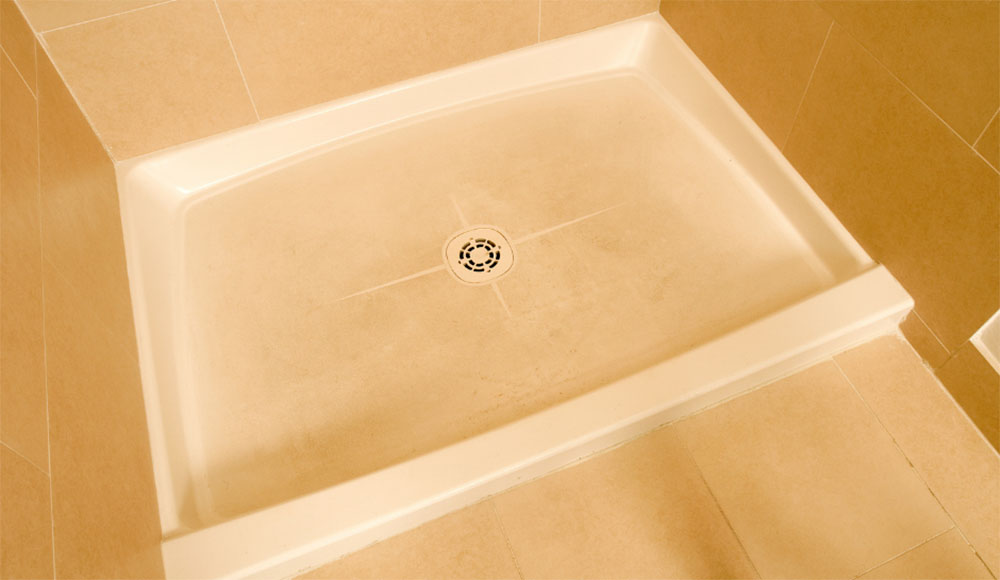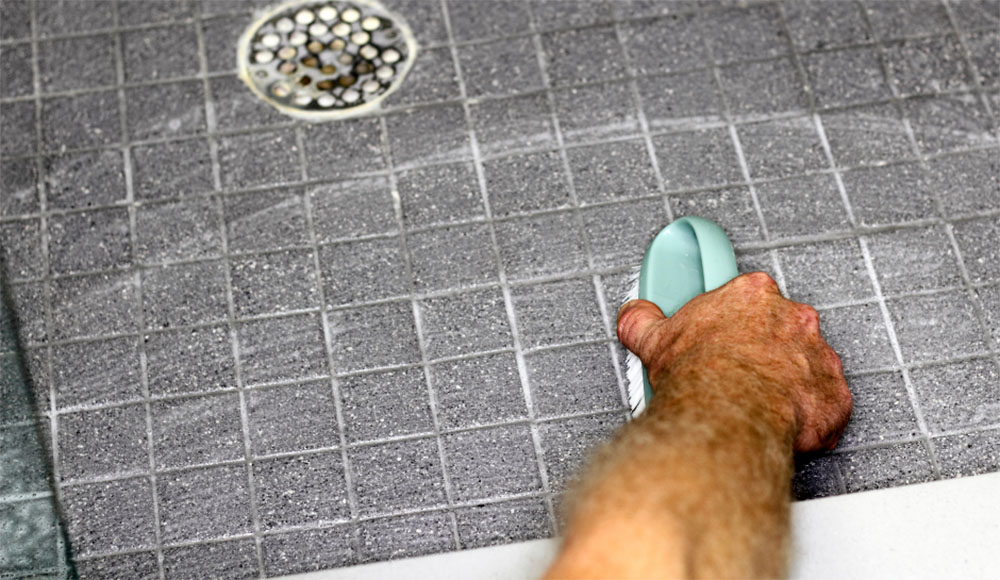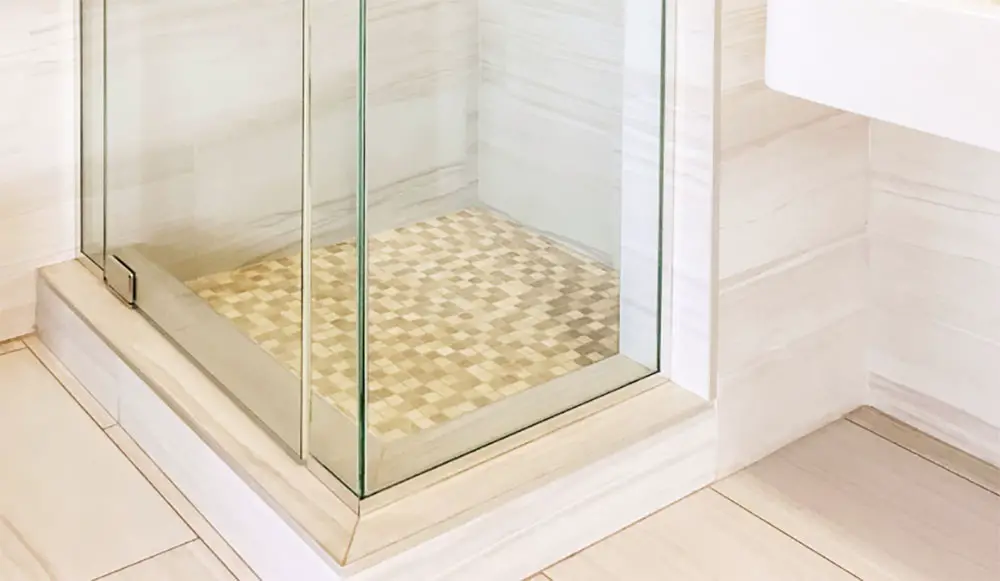While you may not notice it at first, your shower floor is probably a lot dirtier than you think.
You may not think about cleaning this part of your bathroom, as after all it probably gets wet every day so how can it be dirty? But over time you will eventually notice soap scum forming on the floor or watermarks forming in the shower.
How you clean your shower will depend on the type of shower you have, as the material of the shower may only respond well to certain products or cleaning methods.

Also, certain products can be damaging to your shower, especially if it’s made out of fiberglass, so using the right one when cleaning is very important.
Here are all the best methods you should try when cleaning your shower.
Fiberglass – What You Should Know
Most shower floors are fiberglass, meaning that you should use non-abrasive soaps and tools for cleaning.
Here’s what you should use:
- Mild cleaner – dish soap is good at cutting through grease and grime on the floor
- Avoid ammonia – found in many cleaning products, ammonia is an alkaline and can damage fiberglass surfaces.
- Use the right tools – Tools like a two-sided sponge, soft brush or cloth are the best options for cleaning the shower. Avoid steel wool or scrapers as this will scratch and damage the finish of the shower floor.
How To Clean A Shower Floor
1. Run The Hot Water First
This will loosen the soap scum and make cleaning easier
2. Scrub
Apply your non-abrasive cleaner on the shower floor with a sponge or towel. Scrub the cleaner carefully into the corners and around the center of the shower. Don’t forget about the area around the drain, which collects a lot of soap scum and dirt.
If your shower floor is textured, you may need to scrape a little harder to get all of the dirt off.
3. Rinse And Dry
Use the shower to rinse away all the dirt and grime down the drain. Make sure you get in all the corners to avoid soap scum build-up. Once done whip the floor with a cloth and your floors should be sparkling.
How To Make A Homemade Shower Cleaner For Fiberglass Showers
If you don’t want to use too many harsh chemicals when doing a deep clean then there are ways to achieve the same effect with items commonly found in your home. Also by avoiding these chemicals you are less likely to cause damage to your shower.
You Will Need
- Baking soda
- White vinegar
- Spray bottle
- Sponge
- Toothbrush
Method
- Sprinkle baking soda all over the shower floor, making sure you get in all the nooks and crannies
- Fill a spray bottle with half water and half white vinegar
- Spray the vinegar on the baking soda – don’t worry when it begins to fizzle, this is what we want it to do
- Let the paste sit for 15-20 minutes
- Wet a sponge and work that mixture around the floor, paying special attention to those corners and areas of grime.
- Clean the hard to reach areas or small corners with a toothbrush
- Rinse away
- Use a mixture of white vinegar weekly to reduce hard water deposits
Remember that when cleaning a shower you will be in a small and confined space, so even if you are not using any harsh chemicals the smell can still be overpowering sometimes. Make sure that you keep the room ventilated and bring a fan if needed.
Also, you should try to wear rubber gloves to protect the skin on your hands from the chemicals or the general cleaning process
How To Clean Textured Shower Floors
If the floor is textured in some way, like it is made of tile or stone, then cleaning may be more difficult. Here’s a way to make cleaning easier by using oil.

You Will Need
- Mineral oil
- A big bowl or bucket
- Sponge or scrubbing tool
- White vinegar
Method
- Create a mixture in the bucket or bowl that’s four parts mineral oil and one part warm water
- Coat the floor in the mixture and use the sponge to gently scrub the floor in circular motions
- Once done, you a combination of white water and warm water to completely clean the shower floor
You must makee sure all the oil has been removed from the shower as this can be a fall hazard. Repeatedly use warm water to wash all the oil away. Once done your shower should be sparkling clean.
How To Remove Tough Stains
Sometimes a basic clean just won’t be enough for your shower, so here’s how to remove even the toughest of stains.
Vinegar – Removes Soap Scum And Watermarks
Once again vinegar is one of the best products you can use to clean your shower. Soap scum and watermarks are difficult to remove, and they can give the impression that your shower is filthy.
But if you have any white vinegar on hand then this is the perfect product to use. It cuts through the grime as its very acidic, making it ideal for removing grease and oils
Allow a generous amount of vinegar to soak into the stains for a few minutes. With a sponge or brush, scrub the marks away. Rinse away when the stains are gone.
Hydrogen Peroxide – Removes Black Spots Or Streaks
On your white shower floor, you may sometimes see black streaks or blotches and wonder how they got there. Thankfully, these stains can easily be removed.
Use hydrogen peroxide, a mild bleach, to restore the whiteness of the surface. Because this is a slow-acting treatment, make sure no one uses the shower until the next day.
A white cloth soaked in hydrogen peroxide should be used to cover the black spots. Allow the cloth to stay overnight on the spot before washing and drying with a towel.
Bleach – Removes Mildew
Mildew is common in and around the shower due to the wet environment. Mold and mildew may create ugly stains on your shower floor, making it seem old and dirty. It can also put your and your family’s health in danger.
For this method, you’ll need chlorine bleach and a non-abrasive brush. Pour a little amount of bleach onto the stain, being careful not to splatter it. Allow for a few minutes of soak time before scrubbing with a brush and thoroughly washing the floor.

